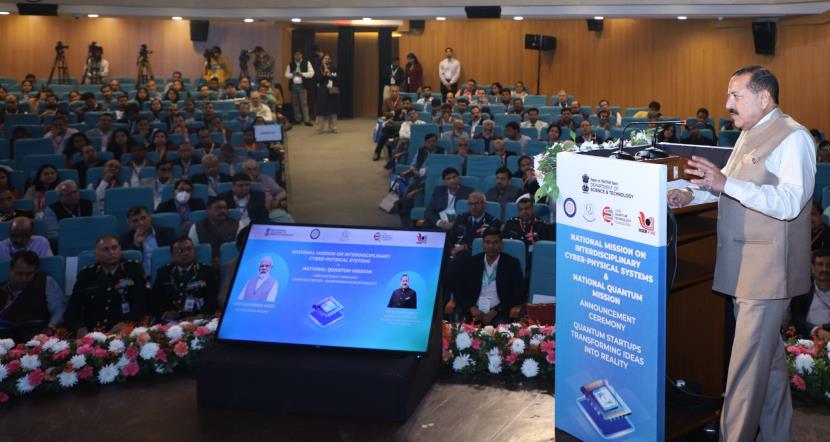India Announces Support for Eight Startups Under National Quantum Mission

Insider Brief:
- Eight startups have been selected under India’s National Quantum Mission and the National Mission on Interdisciplinary Cyber-Physical Systems to advance research in quantum computing, communication, sensing, and materials, aligning with the goal of technological self-reliance by 2047.
- The National Quantum Mission focuses on building satellite-based quantum communication, advanced materials, atomic clocks, and magnetometers, while establishing Thematic Hubs for specialized quantum research and development.
- Selected startups receive infrastructure, mentoring, and industry connections through a rigorous evaluation process managed by the I-HUB Quantum Technology Foundation, accelerating innovation in secure communication, superconducting systems, sensing technologies, and quantum materials.
- Image Credit: Union Minister Dr. Jitendra Singh, Jammu Links News
PRESS RELEASE — In a recent announcement, eight startups have been chosen to receive support under two of India’s flagship initiatives: the National Quantum Mission and the National Mission on Interdisciplinary Cyber-Physical Systems. Union Minister Dr. Jitendra Singh highlighted this selection as part of the country’s broader strategy to drive innovation in advanced technologies and achieve technological self-reliance by the year 2047. By supporting research and development in areas such as quantum computing, communication, sensing, and advanced materials, the program intends to address challenges in science and industry while supporting India’s development in quantum innovation.
The National Quantum Mission & India’s Vision for Quantum Leadership
Launched in April 2023, the National Quantum Mission is focused on seeding and scaling quantum research on a national level. Other key objectives include:
- Secure satellite-based quantum communication over 2,000 kilometers.
- Development of atomic clocks and magnetometers for precision navigation.
- Design of advanced quantum materials like superconductors and topological structures.
- Establishment of Thematic Hubs in academic and R&D institutions, each dedicated to one of the following specialized domains: quantum computing, quantum communication, quantum sensing and metrology, and quantum materials and devices.
Selected Startups
The I-HUB Quantum Technology Foundation at IISER Pune announced the incubation program earlier this year, and invited quantum technology startups to apply by August 31, 2024.
Provisions for selected startups included access to co-working spaces, state-of-the-art facilities, mentoring from quantum experts, and industry connections. Applicants were required to be majority Indian-owned and able to demonstrate market-fit and scalability. The selection process, overseen by the Investment Evaluation & Monitoring Committee, included pre-screening, detailed evaluations, and equity-sharing discussions, with funding decisions finalized within three months.
The eight selected startups represent a diverse range of innovations across quantum technology:
- Quantum Communication
- QNu Labs (Bengaluru): Specializes in developing quantum-safe heterogeneous networks, offering secure communication solutions resistant to cyber threats.
- Superconducting Quantum Computing
- QPiAI India Private Ltd. (Bengaluru): Focused on building a superconducting quantum computer, contributing to scalable and high-performance quantum systems.
- Essential Hardware Development
- Dimira Technologies Pvt. Ltd. (IIT Mumbai): Working on indigenous cryogenic cables, a critical component for maintaining the low-temperature environments needed for quantum hardware.
- Prenishq Pvt. Ltd. (IIT Delhi): Developing precision diode-laser systems, which are essential for quantum computing and sensing technologies.
- Quantum Sensing
- QuPrayog Pvt. Ltd. (Pune): Innovating optical atomic clocks and related quantum metrology technologies, with potential applications in healthcare and precise timekeeping.
- Quanastra Pvt. Ltd. (Delhi): Creating advanced cryogenic systems and superconducting detectors to support quantum sensing and communication efforts.
- Quantum Materials and Photon Detection
- Pristine Diamonds Pvt. Ltd. (Ahmedabad): Designing diamond-based materials for quantum sensing, a promising avenue in quantum materials science.
- Quan2D Technologies Pvt. Ltd. (Bengaluru): Developing superconducting nanowire single-photon detectors to enhance quantum communication capabilities.
According to the announcement, the rigorous evaluation process prioritized startups demonstrating technological feasibility, market potential, and alignment with national objectives.
Impact on Technology and Society
During the announcement, Dr. Jitendra Singh outlined key applications of quantum technology that could have far-reaching societal and industrial implications. Quantum cryptography, he explained, offers a highly secure method of protecting sensitive data, addressing critical challenges in national security and personal privacy. Similarly, quantum sensing technologies are expected to support medical diagnostics and imaging, possibly with unprecedented precision. In the energy sector, quantum simulations hold the potential to optimize power grids and renewable energy systems to create more efficient and sustainable solutions. Quantum network may improve satellite-based communication systems, enhancing GPS accuracy, internet speeds, and secure disaster management networks.
Dr. Singh also stressed the need to broaden the reach of quantum initiatives beyond metropolitan areas, encouraging engagement in smaller towns and rural regions. This strategy would expose younger generations to emerging technologies, potentially inspiring them to contribute to the field and supporting the growth of an ecosystem.
With the National Quantum Mission and support for local startups underway, advancments in research and development in quantum technologies may move ever closer to addressing practical challenges in areas such as communication, healthcare, energy, and national security.
